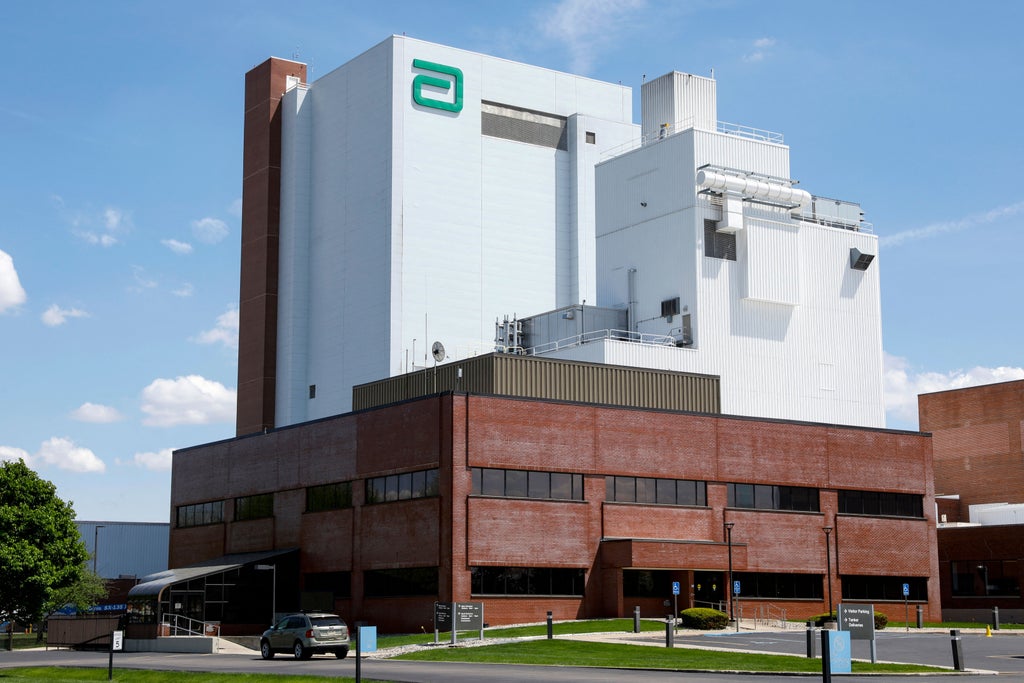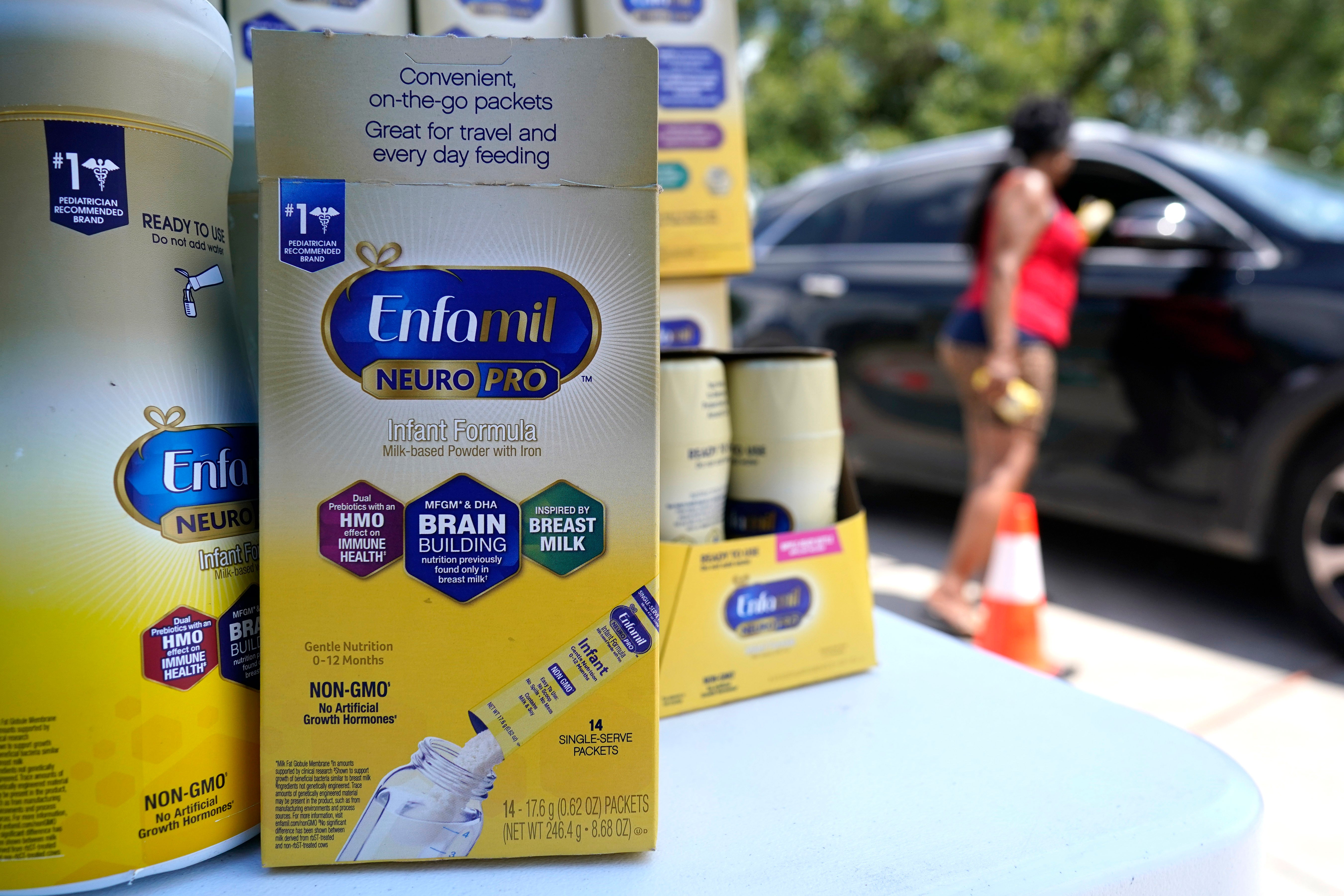
The CEO of Abbott has issued an apology to American families over the baby formula shortage which was largely triggered by the shutdown of its Michigan factory following the deaths of two infants.
Robert Ford, chairman and chief executive of the embattled healthcare giant, wrote an op-ed in The Washington Post on Saturday where he said “sorry” for the crisis and insisted the company is taking steps “to ensure this never happens again”.
“The past few months have distressed us as they have you, and so I want to say: We’re sorry to every family we’ve let down since our voluntary recall exacerbated our nation’s baby formula shortage,” he said.
Supplies of baby formula have plummeted across the US after Abbott Nutrition’s plant in Sturgis, Michigan, shuttered back in February and the nation’s largest manufacturer of baby formula announced a huge product recall of three of its popular products.
The drastic action was taken after two babies died and at least four others were hospitalised with bacterial infections after consuming the formula produced in the factory.
As a result, all production has been stopped at the facility for the last three months.
The US Food and Drug Administration (FDA) launched an investigation and warned parents not to use certain Similac, Alimentum and EleCare products.
Abbott has said that none of its products were positive for the bacteria Cronobacter sakazakii or Salmonella and that a review had indicated that its formula “is not likely” the source of infection in the reported cases.
However, the FDA said it did find the presence of Cronobacter sakazakii at the factory.
Mr Ford addressed the recall in his op-ed saying it “was the right thing to do” as the company “will not take risks when it comes to the health of children”.
He said that “the data collected during the investigation, genetic sequencing, retained product samples and available product from the four complaints did not find any connection between our products and the four reported illnesses in children”.
“However, the FDA’s investigation did discover a bacteria in our plant that we will not tolerate,” he acknowledged.
“I have high expectations of this company, and we fell short of them.”
Mr Ford addressed the “tragic and heartbreaking” reports that babies with allergies or intolerances have been hospitalised because of the shortage as their parents have been forced to feed them alternative products.
“We know that some children have been hospitalized because of the lack of EleCare, a specialized formula for children who cannot digest other formulas and milks. Given their unique needs, children who lose access to it can require medical supervision until the formula is returned to the shelves,” he said.
“I will not mince words — this is tragic and heartbreaking, and it is consuming my thoughts and those of my colleagues.
“Our highest priority is getting babies safe, quality formula they need as fast as possible.”

The CEO promised that the company will prioritise the production of its EleCare product – a hypoallergenic formula for infants with allergies or intolerances – when manufacturing resumes “and get that out the door first”.
Abbott is also launching a $5m fund to help families with medical and living expenses “as they weather this storm”, he said.
The CEO also outlined other steps it is taking to tackle the shortage including converting production lines of adult nutrition products at its Ohio plan “to prioritize production of ready-to-feed liquid infant formula” and flying millions of cans of its powdered formula over from Ireland.
This week, the FDA and Abbott announced they had reached an agreement to work together to restart manufacturing at the Michigan plant as quickly as possible.
Mr Ford described this as “a major step toward quickly and safely reopening”.
The plant is expected to reopen by the first week of June, he said, and it will then take between six and eight weeks from there for the baby formula to reach store shelves.
“By the end of June, we will be supplying more formula to Americans than we were in January before the recall,” he wrote.
The healthcare giant is also making “significant investments to ensure this never happens again” including investing more in safety and quality control, he said.
“These steps we’re taking won’t end the struggles of families today. Some solutions will take weeks, others will take longer, but we will not rest until it is done,” he said.
For the time being, Mr Ford sought to reassure concerned parents that “you can feel safe buying any Abbott product you find on the store shelves” saying it has “passed rigorous inspections”.
However he acknowledged that the company needs to work to regain trust from American parents.
“I will not rest. I want everyone to trust us to do what is right, and I know that must be earned back,” he said.
The CEO’s apology came as the first military planes bringing formula from Europe to the US are arriving in Indiana on Sunday as part of the Biden administration’s efforts to get much-needed supply to American families.
The White House announced on Friday that 132 pallets of Nestlé Health Science Alfamino Infant and Alfamino Junior formula would be flown from Germany to the US this weekend.
A further 114 pallets of Gerber Good Start Extensive HA formula will arrive in the coming days, with around 1.5 million 8-ounce bottles of the three formulas slated to arrive this week.
Military planes will fly the formula as part of “Operation Fly Formula” and it will be distributed in the areas of most need.
National Economic Council director Brian Deese was grilled on CNN’s “State of the Union” around how the US ended up in such dire straits that it needs to airlift formula from other countries.
“I have to ask people asking this are probably wondering: how do we get to the point where the United States of America has to airlift baby formula from another country in order to feed its children?” asked Dana Bash.
Mr Deese said that it is “frustrating” and pointed to the fact that three companies dominate the baby formula market so when one “doesn’t follow the rules” it disrupts the entire supply chain.
“It goes back to this question of how we can bring more competition in our economy, have more providers have this formula so that no individual company has this much control over supply chains,” he said.







